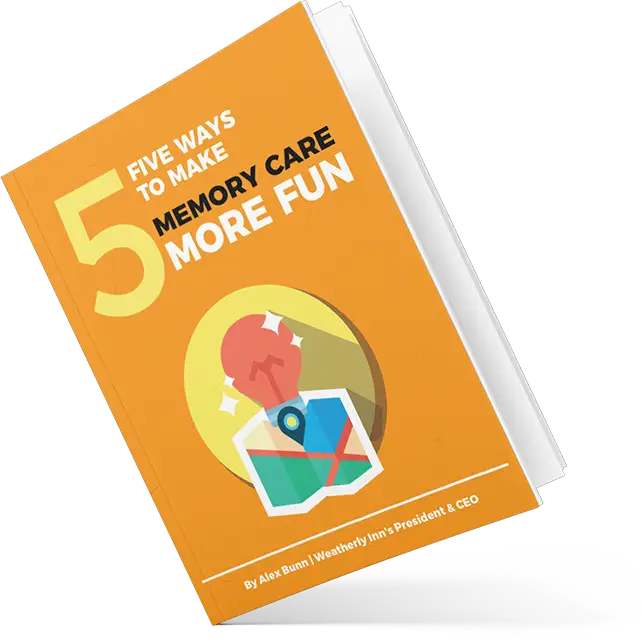February 7, 2020
Chances are, you’re reading this article because you’re tasked with the responsibility of caring for a loved one who’s been diagnosed with Alzheimer’s disease or dementia. You love your family to the moon, but the ongoing strain on time and cost of care can ultimately become too much to bear. We understand, and we’re ready to help.
This article will cover the costs of memory care and explain some ways to fund it, such as Medicaid. We’ll also discuss some financial saving points (like utilities and groceries), so you’ll be more prepared to make your decision when the time comes. If you’re researching memory care costs, you’re in the right place!
- The Alzheimer’s Association suggests planning for memory care as soon as there is a diagnosis. You’re wise to plan ahead!
If you’re looking to compare actual costs of memory care vs. housing your family member through home care, you’ll find a link to our Financial Comparison Planner at the end of this blog.
Memory Care Homes & Their Associated Costs
Often, there is some confusion about the difference between nursing home care, or senior care, as opposed to memory care. Memory care facilities provide a higher level of personal care than a traditional nursing home or assisted living community. There’s a valid reason for this. The average care facility for seniors usually focuses mainly on amenities like a private room or independence. However, the best memory care homes will provide specialized amenities like:
- a homey setting where your family member feels comfortable
- meals served in a family-style setting
- thoroughly secured doors and gates, because dementia may lead to wandering
- highly trained, specialized nursing staff who understand your loved one’s particular requirements
- quality memory-care programs and activities of daily living, used to delay the progression of their disease
Those amenities are in addition to the usual medical care services provided by an eldercare home, like medication management and nutritious menus.
A quality memory care facility will remove the financial and emotional strains of caring for your loved one. And best of all, you’ll sleep well at night knowing they’re in the right place for their unique care needs when that time comes.
In other words, memory care can be costly, but it’s worth every cent.
Your Options for Funding Memory Care Costs
There are a few sources to help pay for the costs of memory care, and many families will seek assistance from more than one source. We’ve put together a different blog on the topic of finance. From long-term care insurance to VA benefits, there may be financial assistance at your fingertips. But don’t expect them to pay the entire cost of memory care.
- You can always reach out to us to talk about your funding options.
The best way to plan for the costs of memory care in the United States is to learn about your various options for funding.
We think Payingforseniorcare.com says it best: “For most families, the expenses of caring for a loved one with Alzheimer’s or dementia are covered not by a single source, but instead by contributions from a variety of sources. Some of these resources are specifically designed for Alzheimer’s patients, and others are of a more general nature.”
We’ll cover a few common memory care funding methods here.
Using Reverse Mortgages to Fund the Costs of Memory Care
Reverse mortgages are an option if your loved one owns their home outright, or at least has considerable equity available. Understand that:
- Reverse mortgages are loans, based on the home’s value as collateral.
- You won’t need to pay it back until you sell the home, or stop living there.
- If you fail to pay back the note, the home is at risk.
To illustrate, imagine a senior named Ted. He’s a widower and owns his home, which is valued at $300,000. His mental state has deteriorated to the point he’s struggling to care for himself and needs to live in a memory care home.
Ted can get a reverse mortgage from the bank that will help pay the costs of a memory care facility. Eventually, when Ted passes away, that money will be due back to the bank. His family will need to pay back the loan. If Ted uses $100,000 to supplement his memory care costs, his family might choose to sell his $300,000 home upon his passing, and split the remaining $200,000.
Know That Medicare’s Benefits for Memory Care Are Limited to 100 Days
Medicare won’t pay for an infinite amount of time in a memory care facility. It will cover:
- 100% of the first 20 days of care
- 80% of the next 80 days of care
Medigap or other Medicare supplement plans cover a portion of the costs of memory care, but only if your loved one is enrolled in the program. The benefit totals 20% of the care cost, but that can be a significant saving!
In other words, enroll your family member in a Medigap or other supplement plan if they have Alzheimer’s or dementia. It makes good sense, even before the need for memory care.
Ultimately, it’s often a combination of Medicare supplements, reverse mortgages, and family spending that pays for the costs of memory care.
The good news is that there are some real savings associated with memory care that help to mitigate the costs of long term care.
Financial Savings of Memory Care
Many families try their best to keep an Alzheimer’s or dementia patient in home health care for as long as possible. But eventually, a loved one’s state of mind may deteriorate to the point it’s unhealthy, even dangerous, for them to be without professional dementia care or memory care services. Even with an entire family dedicated to their care, there will come a time when the best situation for your loved one is a memory care facility.
- Making a move towards memory care is intimidating, so we’ve provided more articles on selecting the right memory care facility, and how to begin your search for memory care here in Seattle.
But you should know that the host family will likely feel a tremendous relief – both physical and financial. Housing a human being is expensive, even when they are in the best of health. From an economic standpoint, you’ll be relieved of many monthly costs associated with the type of care your loved one needs:
- grocery expenses
- additional utilities
- the time and fuel needed to transport your loved one to doctor’s appointments
Furthermore, you’ll get more time back in your schedule, because you’ll be doing less:
- laundry
- running to appointments
- picking up (and paying for) prescriptions
- managing medicines
- preparing meals and snacks, and the related cleanup time
Caregiver stress and burnout are a genuine struggle. It can be incredibly difficult to care for our aging parents or grandparents, maintain a household (or two), keep everyone fed, laundered, and still put in a quality day’s work at the office. Long-term caregiving can lead to stress, headaches, marital struggles, insomnia, and every other stress-related syndrome one can imagine.
According to the US Department of Health and Human Services, caregivers experience far more anxiety and stress than other people, and most often, it’s women who take on the role of health care.
But again, the most valuable aspect of memory care, the part that makes the cost truly worthwhile, is the feeling that your loved one is in the right place with the exceptional care options they need.
If you’d like to get a thorough understanding of the cost of dementia care units, or those associated with memory care, versus the costs of aging in place, check out Weatherly Inn’s Senior Living Financial Comparison Planner. Just fill out the form, and we’ll email you the planner. It helps immensely to understand what you’re currently spending in elder care compared to what memory care costs.
Related Reading & Resources:



